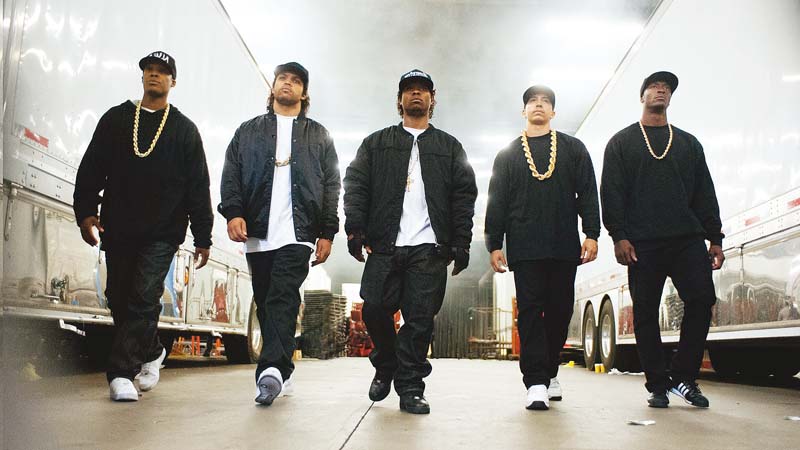
The making of the film was as eventful — well, almost — as the story of the rappers it tells. On-set violence, an alleged murder by one of the principal cast members, ugly casting controversies, the use of at least four writers and much else have added to the indiscipline, energy, tonal shifts, vigour and guts that are the heart and soul of the film.
Straight Outta Compton is not meant exclusively for lovers of gangsta rap. Audiences who are not familiar with N.W.A. are likely to enjoy it as much as those who are fans of the band. There is a lot in the film that has little, if anything, to do with music.
The film opens in the late 1980s, in the economically depressed and violent neighbourhood of Compton in Los Angeles, where cinematographer Matthew Libatique’s gloomy shots, together with on-screen titles, introduce audiences to the three band members who formed NWA.
Eric “Eazy-E” Wright (Jason Mitchell) is a small time runner at the lowest rung of the drug trade. Andre “Dr Dre” Young (Corey Hawkins) is the very talented but unappreciated deejay at a local club. O’Shea “Ice Cube” Jackson (O’Shea Jackson Jr) is a high school student who writes poems. The three young men deal with abuse, indignities and humiliation, amidst gang violence, drug trading, police brutality and rampant poverty, as they come together to form what would go on to become the enormously successful and influential NWA. The band’s debut album, Straight Outta Compton, ushered in the era of gangsta rap with its wildly successful single F*** Tha Police (a song that got the band a warning letter from the FBI for its profanity). Today that song is ranked at number 425 in Rolling Stone’s “500 Greatest Songs of All Time” list.

Gray, with the help of his writers, cinematographer and supremely talented actors, accurately depicts the atmosphere that fostered the song, less a revenge fantasy and more a stinging indictment of police brutality and injustice. Gray explores how the 15-year stint that former chief of the Los Angeles Police Department Daryl Gates enjoyed from 1978 to 1992 was tragic for African-Americans. The controversial police chief all but institutionalised the unprovoked brutalisation, victimization and humiliation of young black men in the city. Gray’s film illustrates, with electrifying intensity, events that transpired during Gates’ tenure. He depicts the tremendous emotional and physical abuse that lay at the roots of the unrelenting anger that made NWA.’s music powerful and that got the band in trouble with the police, the FBI, conservative groups, parental groups, radio talk show hosts, censorious writers, and, of course, the sanctimonious Tipper Gore — wife of Al Gore and Second Lady of the United States from 1993 to 2001 — throughout its existence.
On its surface, the film is a traditional tale of a group of disadvantaged young men who fight their way out of tragic circumstances and reach the height of fame and success in the world of both music and culture. In reality, it is a complex, daring and tragic account of the effects of racism, injustice, betrayal, self-righteousness, and censorship on American society. It is a highly intelligent film.
Straight Outta Compton has many strengths — flawless performances, on-point direction, apropos cinematography, accurate evocation of the eighties, rousing music performances, social relevance, not to mention the welcome addition of new lyrics to some well-known songs — and evokes many emotions, including happiness, anger, frustration, frustration and sorrow; but ultimately, it ends up breaking one’s heart. Thirty years have passed and, yet, one continues to see headlines about events very similar to those depicted in the film. The unfortunate realities of being a minority in the United States of America are as palpable today as they were several decades ago. Current news headlines constitute a sad proof of the inescapable relevance of Straight Outta Compton.
NWA. band members undoubtedly found fantastic success as musicians but seemed to have failed as First Amendment and minority rights crusaders. That is the real American tragedy.

Published in The Express Tribune, Sunday Magazine, September 6th, 2015.


1719660634-1/BeFunky-collage-nicole-(1)1719660634-1-165x106.webp)

1732276540-0/kim-(10)1732276540-0-165x106.webp)












COMMENTS (11)
Comments are moderated and generally will be posted if they are on-topic and not abusive.
For more information, please see our Comments FAQ